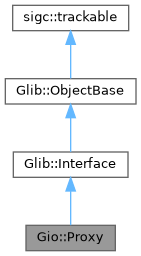|
| | Proxy (Proxy &&src) noexcept |
| |
| Proxy & | operator= (Proxy &&src) noexcept |
| |
| | ~Proxy () noexcept override |
| |
| GProxy * | gobj () |
| | Provides access to the underlying C GObject.
|
| |
| const GProxy * | gobj () const |
| | Provides access to the underlying C GObject.
|
| |
| Glib::RefPtr< IOStream > | connect (const Glib::RefPtr< IOStream > &connection, const Glib::RefPtr< const ProxyAddress > &proxy_address, const Glib::RefPtr< Cancellable > &cancellable) |
| | Given connection to communicate with a proxy (eg, a SocketConnection that is connected to the proxy server), this does the necessary handshake to connect to proxy_address, and if required, wraps the IOStream to handle proxy payload.
|
| |
| void | connect_async (const Glib::RefPtr< IOStream > &connection, const Glib::RefPtr< const ProxyAddress > &proxy_address, const SlotAsyncReady &slot, const Glib::RefPtr< Cancellable > &cancellable) |
| | An Asynchronous version of connect().
|
| |
| void | connect_async (const Glib::RefPtr< IOStream > &connection, const Glib::RefPtr< const ProxyAddress > &proxy_address, const SlotAsyncReady &slot) |
| | An Asynchronous version of connect().
|
| |
| Glib::RefPtr< IOStream > | connect_finish (const Glib::RefPtr< AsyncResult > &result) |
| | See g_proxy_connect().
|
| |
| bool | supports_hostname () const |
| | Some proxy protocols expect to be passed a hostname, which they will resolve to an IP address themselves.
|
| |
| | Interface () |
| | A Default constructor.
|
| |
| | Interface (Interface &&src) noexcept |
| |
| Interface & | operator= (Interface &&src) noexcept |
| |
| | Interface (const Glib::Interface_Class &interface_class) |
| | Called by constructors of derived classes.
|
| |
| | Interface (GObject *castitem) |
| | Called by constructors of derived classes.
|
| |
| | ~Interface () noexcept override |
| |
| | Interface (const Interface &)=delete |
| |
| Interface & | operator= (const Interface &)=delete |
| |
| GObject * | gobj () |
| |
| const GObject * | gobj () const |
| |
| | ObjectBase (const ObjectBase &)=delete |
| |
| ObjectBase & | operator= (const ObjectBase &)=delete |
| |
| void | set_property_value (const Glib::ustring & property_name, const Glib::ValueBase & value) |
| | You probably want to use a specific property_*() accessor method instead.
|
| |
| void | get_property_value (const Glib::ustring & property_name, Glib::ValueBase & value) const |
| | You probably want to use a specific property_*() accessor method instead.
|
| |
| template<class PropertyType > |
| void | set_property (const Glib::ustring & property_name, const PropertyType & value) |
| | You probably want to use a specific property_*() accessor method instead.
|
| |
| template<class PropertyType > |
| void | get_property (const Glib::ustring & property_name, PropertyType & value) const |
| | You probably want to use a specific property_*() accessor method instead.
|
| |
| template<class PropertyType > |
| PropertyType | get_property (const Glib::ustring & property_name) const |
| | You probably want to use a specific property_*() accessor method instead.
|
| |
| sigc::connection | connect_property_changed (const Glib::ustring & property_name, const sigc::slot< void()> &slot) |
| | You can use the signal_changed() signal of the property proxy instead.
|
| |
| sigc::connection | connect_property_changed (const Glib::ustring & property_name, sigc::slot< void()> &&slot) |
| | You can use the signal_changed() signal of the property proxy instead.
|
| |
| void | freeze_notify () |
| | Increases the freeze count on object.
|
| |
| void | thaw_notify () |
| | Reverts the effect of a previous call to freeze_notify().
|
| |
| virtual void | reference () const |
| | Increment the reference count for this object.
|
| |
| virtual void | unreference () const |
| | Decrement the reference count for this object.
|
| |
| GObject * | gobj () |
| | Provides access to the underlying C GObject.
|
| |
| const GObject * | gobj () const |
| | Provides access to the underlying C GObject.
|
| |
| GObject * | gobj_copy () const |
| | Give a ref-ed copy to someone. Use for direct struct access.
|
| |
Proxy - Interface for proxy handling.
A Proxy handles connecting to a remote host via a given type of proxy server. It is implemented by the 'gio-proxy' extension point. The extensions are named after their proxy protocol name. As an example, a SOCKS5 proxy implementation can be retrieved with the name 'socks5' using the C API's function g_io_extension_point_get_extension_by_name().
- Since glibmm 2.28:
| bool Gio::Proxy::supports_hostname |
( |
| ) |
const |
Some proxy protocols expect to be passed a hostname, which they will resolve to an IP address themselves.
Others, like SOCKS4, do not allow this. This function will return false if proxy is implementing such a protocol. When false is returned, the caller should resolve the destination hostname first, and then pass a ProxyAddress containing the stringified IP address to g_proxy_connect() or g_proxy_connect_async().
- Since glibmm 2.26:
- Returns
true if hostname resolution is supported.

 Public Member Functions inherited from Glib::Interface
Public Member Functions inherited from Glib::Interface Public Member Functions inherited from Glib::ObjectBase
Public Member Functions inherited from Glib::ObjectBase Protected Member Functions inherited from Glib::ObjectBase
Protected Member Functions inherited from Glib::ObjectBase